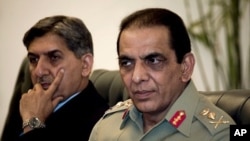Pakistan is under pressure from the United States to launch a full-scale military offensive in the North Waziristan region to uproot bases linked to the militant Haqqani network that Washington says are fueling the Taliban insurgency in Afghanistan.
U.S. military commanders also allege that the ISI, the Pakistani military's intelligence agency, is helping the insurgents stage deadly attacks on international forces in Afghanistan. Reports from Washington suggest that Islamabad’s reluctance to go after the insurgents in Pakistan's North Waziristan could prompt a unilateral U.S. military offensive there.
But speaking before a closed-door meeting of members of the parliament’s defense committees Tuesday night, Army Chief General Asfhaq Parvez Kayani urged the United States to focus its efforts on stabilizing neighboring Afghanistan rather than pressuring his country to step up anti-militant operations.
Details of Kayani's comments
Former Pakistani spy chief Senator Javed Ashraf Qazi was among the lawmakers who attended the meeting at the army headquarters in Rawalpindi. Speaking to VOA, he provided some details of General Kayani’s remarks.
“He [Kayani] said, 'we want good relations with the United States, but we do not want to be the punching bag. We do not want to be the scapegoat for failures of their actions in Afghanistan,'" said Qazi in relating what the general discussed. "He said [referring to the United States], 'don’t do that, if you want us to help you, then you have got to make up your mind that you cannot insult us and blame us, and yet ask for our help.”
Senator Qazi said General Kayani also addressed U.S. allegations that the Pakistani military's spy agency, the ISI, is helping the Haqqani network target American interests in Afghanistan.
“He [Kayani] said that, 'I don’t deny that ISI has contacts, because no worthwhile intelligence agency can live or function without contacts in every direction. If you want information, you have to have contacts. Contacts do not mean that you are supporting them or you agree with them, contacts only means that you have somebody that you know within who will supply you information. And similarly, in fact, CIA has contacts, the British intelligence has contacts, so why pick up on ISI,'” said Qazi.
Forces amassing
The security meeting took place amid reports that the U.S. and NATO have increased the number of troops in the Afghan province bordering Pakistan’s North Waziristan district.
This has intensified fears here that the United States is preparing a cross-border offensive against the Haqqani network.
Qazi told VOA that participants in the meeting also were keen to know General Kayani’s stance on the troop buildup on the Afghan side of the border.
“[His] response was that we do not know as yet. 'We are watching. There is [a] concentration of U.S. troops across, but it could be for an operation within Afghanistan. And therefore, let us wait and see.' [And he said] that 'in case they have the intentions of coming across with these troops, then they will have to think 10 times before they do it.'”
Local media reports have quoted some participants in the meeting as saying that Kayani did not comment directly on his country’s response to a possible U.S. military action on Pakistani soil, but reminded the lawmakers that “Pakistan is a nuclear power and must not be compared with Iraq and Afghanistan.”
Reducing disagreement
General Kayani also is said to have told the parliamentarians that the military could take action in North Waziristan immediately if he were convinced it would solve all problems in the region.
The rare security briefing took place amid reports that U.S. Secretary of State Hillary Clinton plans to visit Islamabad later this month.
Pakistan's information minister, Firdous Ashiq Awan, told VOA she hopes Clinton’s trip will contribute to narrowing differences over the way forward in the joint war against terrorism.
“All those sore issues, they should be settled and resolved, and it can only be done through negotiation and dialogue,” said Awan.
The minister said meetings in Islamabad would help the two sides understand each other’s point of view, enabling Pakistan and the United States to build on their strategic partnership.













